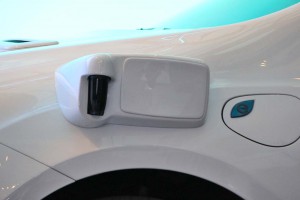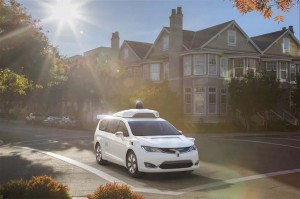While there are a growing number of autonomous vehicle prototypes on the road these days, Waymo and Fiat Chrysler Automobiles made headlines when they announced, earlier this week, plans to direct as many as 62,000 Pacifica Hybrid minivans into the self-driving ride-sharing service the Google spin-off will launch later this year.
By some estimates, 20% or more of the miles Americans clock on the road will be in driverless vehicles operated by ride-sharing services like Waymo, Uber and Lyft by the end of the coming decade. Millions of motorists may opt to give up their personal vehicles and switch to those services. Millions more are expected to own their own autonomous vehicles.
Until recently considered a laggard in the self-driving field, FCA has jumped in big, relying on partnerships with not only Waymo, but BMW and mega-supplier Aptiv. And that approach will not only help it to make up for lost time but give FCA several alternative paths to follow.
(FCA planning to plug in with 30+ electrified vehicles. Click Here for the full story.)
“We have no doubt about the huge market” that will come for autonomous technology, said Harald Wester, the head of autonomous and connected vehicle programs for FCA, during the automaker’s presentation of its next five-year plan on Friday.

Full autonomy requires expensive hardware, like this LIDAR unit, one of five on each Waymo Pacifica.
Waymo is widely considered one of, if not the leader in autonomous vehicle development. It has clocked millions of miles testing on public roads, even more through computer simulation. It has been operating a pilot ride-sharing program with human backup “operators” in Phoenix using a mix of vehicles including Pacifica Hybrids. It recently received approval from the State of Arizona to launch a commercial venture that will eventually abandon drivers entirely. Waymo CEO John Krafcik in April told TheDetroitBureau.com that the plan is to continue rolling out the service in other U.S. cities.
“We’re excited to deepen our relationship with FCA that will support the launch of our driverless service, and explore future products that support Waymo’s mission,” Krafick said in a joint statement issued with FCA this week, the automaker’s CEO Sergio Marchionne adding that his company “is committed to bringing self-driving technology to our customers in a manner that is safe, efficient and realistic. Strategic partnerships, such as the one we have with Waymo, will help to drive innovative technology to the forefront.
(For a complete look at FCA’s 5-year product plans, Click Here.)
But at the five-year plan meeting in Milan, Italy on Friday, Marchionne admitted he is concerned about the potential threat driverless ride-sharing vehicles could pose. By dropping the cost of a ride down so low that it would be cheaper to hail a ride from a Waymo than own a car, consumers may no longer car about vehicle brands, many analysts warn.

The rise of driverless ride-sharing service could actually be a major problem for automakers, commoditizing their products, warned FCA CEO Marchionne.
That could make vehicles “commoditized,” sold like store brand soap, at marginal profit. “All bets are off” when it comes to which carmakers could survive in such a situation, he warned, adding it would impact “all of us.”
(For more on why Waymo will acquire up to 62,000 Chrysler Pacifica Hybrids, Click Here.)
Whether that scenario will play out is far from certain. But it’s likely that many automakers will offer varying levels of hands-free technology directly to consumers. Currently, said Wester, even the best allow a motorist to take hands off the wheel for only a moment at a time. But he expects to see FCA start rolling out more advanced systems in the coming years, with full autonomy, meaning the ability for an owner to completely hand off driving duties, to be available by 2023. And working with its partners, FCA is trying to “accelerate that timing.”
Initially, such a system would be offered only on high-line products, an Alfa Romeo or Maserati, perhaps, or a top-line Jeep or Ram truck. That’s no surprise considering Wester expects what is technically known as a Level 4 system to initially cost $30,000. Over time, he said, FCA hopes to trim that to $10,000.
Look for FCA to start offering more limited semi-autonomous technology by 2020, Wester hinted, starting with the next-generation Jeep Grand Cherokee.
(Click Here to find out why Japan’s SoftBank is investing $2.25b in GM’s autonomous Cruise subsidiary.)

